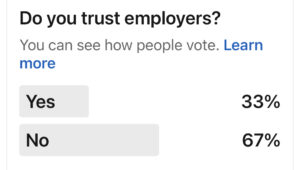What is “quiet quitting?”
When I first heard the term, “quiet quitting,” it sounded like a reference to people who were quitting their jobs and just hanging out at the office until the notice period or job ended. Nope.
The Society for Human Resource Management (SHRM) posted an article recently stating, “The term ‘quiet quitters’ has recently been coined to describe employees choosing not to go above and beyond at work. As a Gallup poll reveals, ‘quiet quitters make up at least 50 percent of the U.S. workforce, probably more.’ Detachment at work has been increasing since 2018, based on Gallup data collected since 2000.”
It is a term describing someone completing the task(s) they were hired to do, no more or less. So why the negative nomenclature?
Years ago, in a polo shirt and khakis… far, far away… I worked for a corporation. I attended events after hours, before work, and on weekends and never thought much about it. A few things happened during that time that shaped my current approach to work.
- My superior asked if I recorded my PTO hours when I had to duck out for 2 hours, due to a child’s appointment. A rare occurrence. No, I had not recorded the time as PTO… did he add 15 hours for the before and after hours events I’ve been attending during my own personal time?
- I was just starting my company and was fully transparent with my employer at every stage of my journey. One afternoon, I was pulled into an office and was asked (accused?) of representing my own interests at an after hours function the night before. Stifling a knee-jerk reaction fueled by shock and anger, I responded in truth, “No, I was only representing my employer.” But what if I had been representing myself? After all, isn’t it “my time” after working hours?
Employers know they are providing payment for a service. Many believe they are due 100% of your time.
That’s just not how it works.
So, I literally roll my eyes when I read discussion of “quiet quitting.” If employers want more than the standard 40-hours-per-week, then make sure that is clear in the hiring arrangement. If they want employees to take on more responsibilities than what they were hired to do, come to an agreement with each individual, adjust the job description, and compensate accordingly. Provide more than 2 weeks of PTO and 5 sick days. Quit taking advantage of employees, their workloads, and their personal time. Structure your workforce appropriately.
When I started my company 8 years ago, all employees worked from home or on a client site (as needed). My PTO policy has always been, “take care of yourself and do what needs to be done.” You need to visit your child at school, go for it. If you have a doctor’s appointment, fit it in. My employees are accountable for completing the requirements of the job to the best of their ability. It doesn’t matter if they are working at 7:00 am or 9:00 pm, or 8-5. They always know what needs to be done and, as functional adults, they can figure out the when and how.
“Quiet quitting” is really an excuse for poor leadership and burned-out employees, a trending phrase to make people feel obligated to make their employment the highest priority in life. But really, it’s simply describing people who are showing up and getting the work done.
What are your thoughts?
Want to attract humans? Treat them like humans. Below are a few articles that may (or may not) shock you.
- Worker says boss asked him to come in and sign performance evaluation while his newborn son was gravely ill
- Nightmare Bosses
- 37 Horrible Employers And Bosses That Should Honestly Just Fire Themselves
Results from our LinkedIn poll: “Do you trust employers?”


